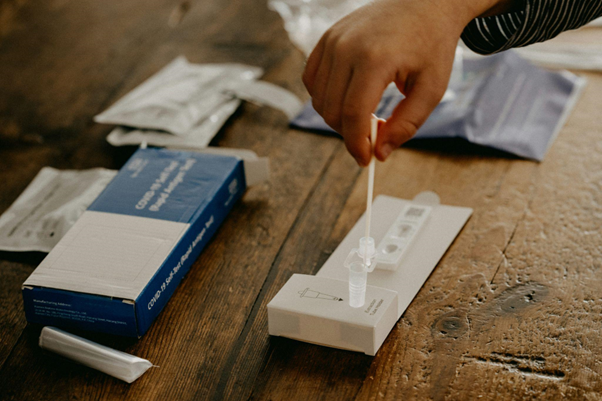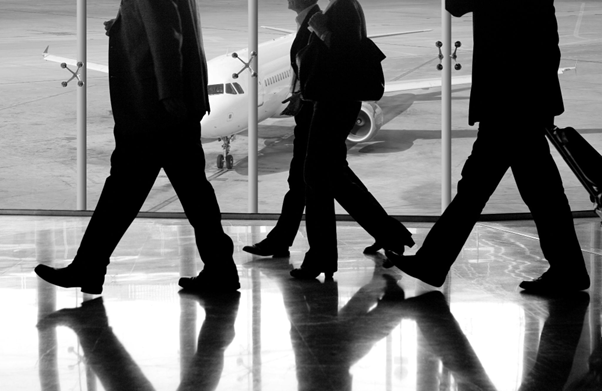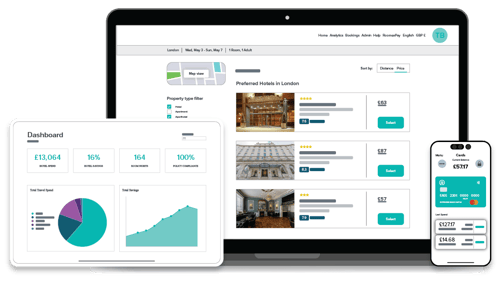It’s not just the change in the weather that’s different. There’s a sense of optimism in the air, as we enter a new time in the post-pandemic world. Ever since the start of the global pandemic, business travel rules have changed, and with it, so have many company travel policy documents.
Whether you’re revising, updating, or crafting your company travel policy, there’s a few valuable points to consider. After all, putting colleagues safety and well-being front and centre of your travel policy will help to mitigate problems and demonstrate your credentials as a forward-thinking and caring company. At a time when it’s an applicant’s market, keeping staff happy and engaged will serve you well.
So then, let’s dive straight in:

TD;LR
- In the post-pandemic world, updating your company travel policy is crucial for prioritising safety and demonstrating care for employees.
- Key considerations include aligning with government guidelines, addressing Covid-19 testing protocols, clarifying hybrid work expectations, simplifying approval processes, and distinguishing between essential business travel and discretionary trips.
- Implementing tools like self-service booking systems and creating a concise travel checklist can streamline processes and ensure clarity for all employees.
Remote working practices
As we learn to ‘live with Covid’ and the ever-changing rules, it’s important to be aligned with government guidelines and be clear about company expectations.
In 2022, 72% of managers told McKinsey that they have adopted permanent remote-working arrangements for some of their employees—a change that needs to be reflected in travel policies.
Post-COVID, staff will need updated guidance around how to access testing kits out of the office, vaccine requirements, entitlement around paid-leave, and flexible working arrangements in destination. Speaking of business travel rules, colleagues will also benefit from quick access to government links both on a local and international level for working remotely.
Remote working means more companies like design app developer Sketch, will offer annual meet-ups to bring their workforce together. Travel managers will increasingly need to book large-scale trips that facilitate face-to-face time between staff as well as clients—and travel policies will need to set expectations for these trips.

Testing positive for Covid-19
Whether you were planning to review your business travel policy or not, it will definitely need to be updated to include guidelines around testing for Covid-19, as part of your overall duty of care.
This ought to offer clear advice around the following:
- Identifying symptoms of Covid-19.
- Company policy on self-isolation (at home and whilst working remotely).
- Who to notify in the event of a positive test.
- Healthcare guidance, especially in relation to any corporate private healthcare.
- Informing those who they might have come into contact with.
- Expectations around quarantine in relation to the workplace (office or remotely).
- Extending or cancelling accommodation in relation to a positive result.
Sharing space
While some companies are adopting a ‘business as usual’ stance, others have taken the time to review certain parts of their travel policy. Specifically, considerations around car sharing, room sharing and travelling with colleagues. In an industry report by Deloitte, they express that domestic travel has become ‘safer and easier’ but corporate travel in general is still anywhere between 60-80% of its previous number, so this is something that needs to be given its due consideration.

Hybrid working
In the world of post-covid travel, colleagues also expect clarity around hybrid working. In recent months, we’ve seen an increase in remote working demands, forcing organisations to rethink working practices. Even if your team is on business travel to another region or office, what are the rules around going into the office, or logging on outside of work hours? Your revised corporate travel policy is the perfect place to update this.
Easy approvals
It has never been more important to simplify the business travel rules for colleagues, allowing them to make and cancel bookings with the flexibility they need. However, contrary to this, the Deloitte report suggests that even more red tape is in place, adding to the challenges that colleagues face.
If you aren’t already using a self-service booking system like Roomex, now is a good time to consider introducing one. Not only does it speed up the process for colleagues, but it can deliver great cost and time savings to the company too.
Business travel vs workforce travel
On that note, have you considered distinguishing between business travel and workforce travel? It’s a theme that some companies have been forced to consider, in line with reduced budgets, as well as looking after employee wellbeing. Finding the right balance and communicating the difference between necessary workforce travel and travel that might not be as vital, can help provide more clarity to your teams.
Thoughts to consider in post-covid travel are:
- Is business travel necessary, or could this meeting/event be conducted remotely?
- Does the trip align with the current business priorities?
- Will this trip impact on the bottom line, or have any commercial impact?
Is this trip valuable for training or relationship building?

Business travel checklist one-pager
Finally and with all the above points considered, it’s a great idea to produce a one-pager checklist for colleagues on post-covid travel rules.
This should inform them on; important points to consider prior to travel, useful contact numbers for emergencies whilst travelling, details of travel insurance contacts, how to make or cancel transport and accommodation, health access while working remotely and important safety guidelines from vaccines to mask wearing.
This one-pager should dovetail into your updated business travel policy and be easily accessible to all colleagues on your intranet or somewhere similar.
To help your employees adhere to your updated company travel policy, consider using a travel management programme like Roomex. When your staff book, hotels that are included in your policy will be clearly indicated as preferred options. And, with 87% of global business travellers now using smartphones while they travel, being able to access and manage bookings via an on-the-go app is imperative.
FAQs
Why should a company have a travel policy?
A company travel policy ensures consistency, safety, and cost control for all business trips. It also demonstrates care for employee well-being and helps mitigate risks associated with travel.
How do we make sure employees adhere to a company travel policy?
Implementing a travel management programme like Roomex will help you streamline bookings within policy guidelines. This simplifies the process for your employees, ensuring compliance while facilitating cost and time savings for your company.
How has COVID impacted business travel?
While COVID initially curtailed business travel, according to a projection made in the GBTA’s latest Business Travel Index Outlook report, corporate travel spending is expected to surpass pre-pandemic levels by 2024, reaching over $1.4 trillion. Despite disruptions, up to 50% of business travellers now extend trips for leisure purposes.

April 14, 2022
